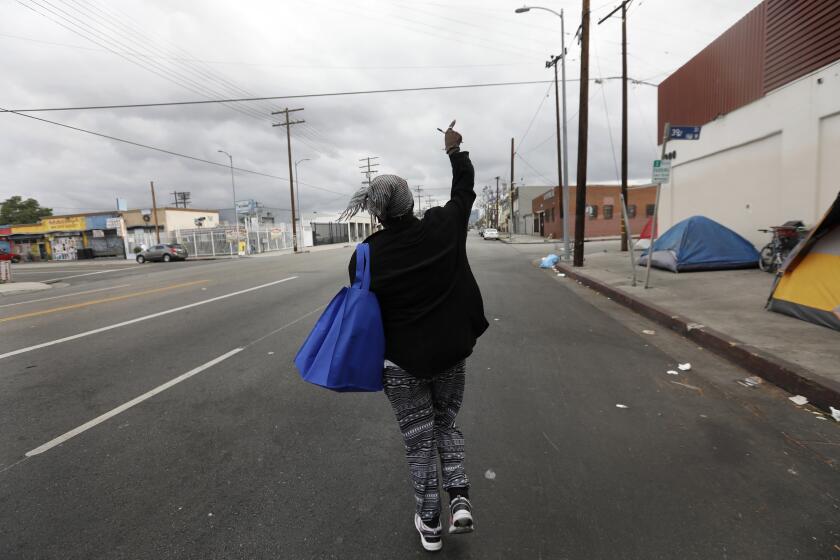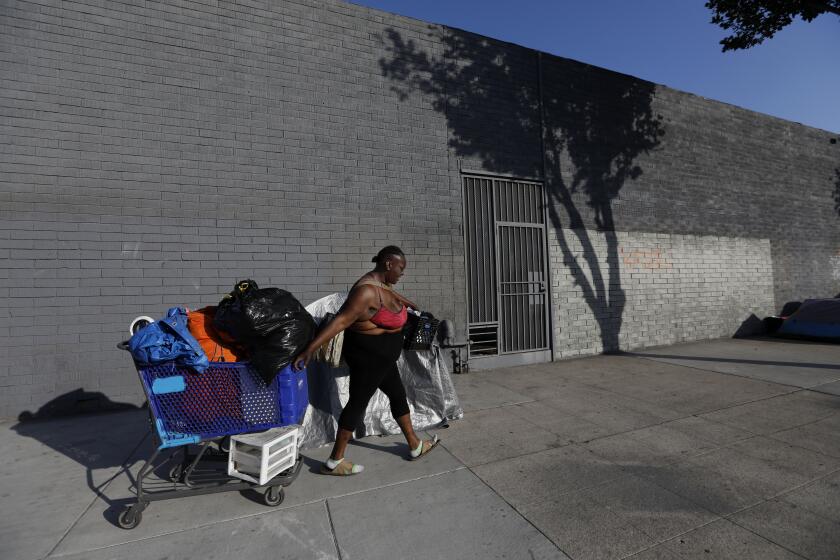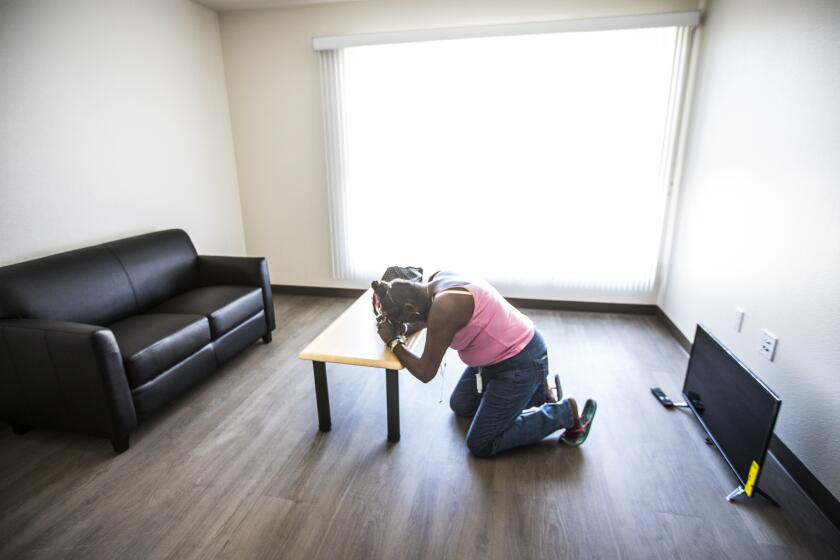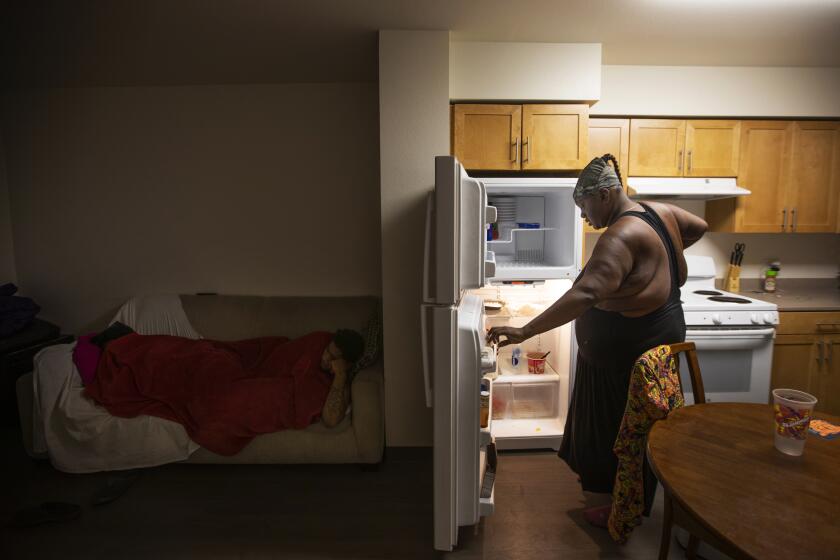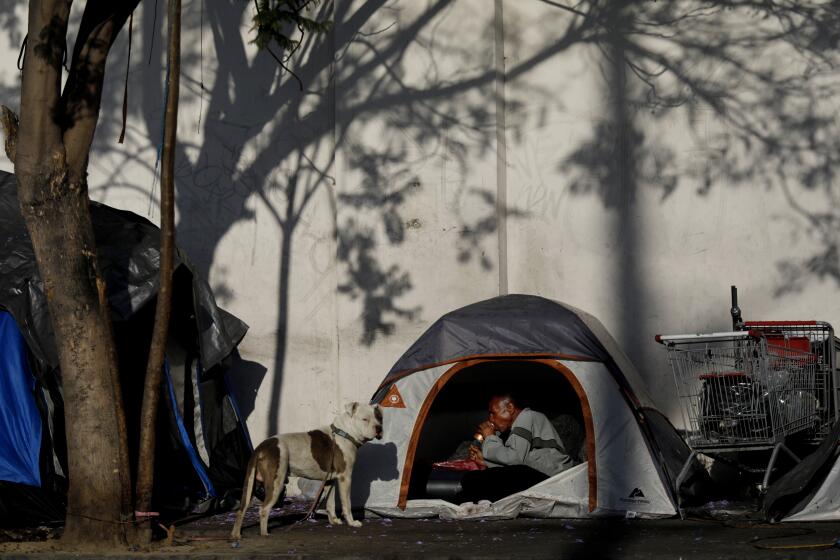They moved from homeless camp to brand-new apartment. Now comes the hard part
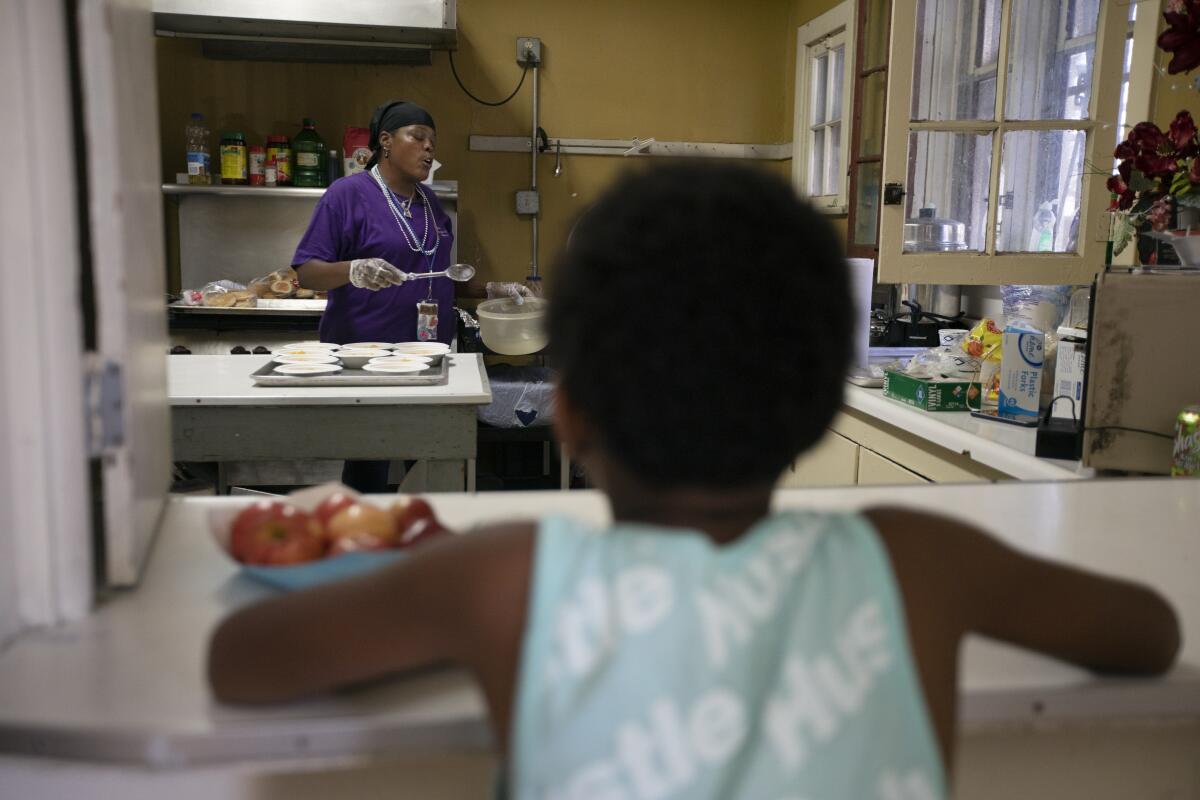
- Share via
Mondays are bread day at the 127th Street Apartments when a weekly donation of nearly expired baked goods lands in the community room and residents make their way through the double doors to see what’s arrived.
Once homeless and now living in new apartments, they find their dollars stretched thin and are happy with the handouts. The delivery comes at noon, and that’s when Big Mama and Duanne Hardaway headed downstairs.
Nearly a year ago, they moved into this building from their tents strung on a stretch of sidewalk a few miles south of downtown Los Angeles. The agencies who assisted them called the effort Encampment to Home, a special program that tested the city and county’s ability to cut through red tape and get homeless people off the streets.
But the residents of Broadway Place — where Big Mama and Hardaway lived — call it a blessing.
After The Times reported the story of their move — and its aftermath — Big Mama and Hardaway were eager to talk about how their lives have changed in the last few months. Loaded with Danish and muffins, they sat in a small activity room and began by peering over a copy of Sunday’s newspaper.
A little stunned by their sudden status as celebrities, the two neighbors took a moment for a victory lap, reliving the ups and downs of last year: the cleaning sweeps by the city’s sanitation department, the death of the pit bull Caesar, their neighbors on Broadway Place.
“Here I was pointing to God,” said Big Mama as she studied a picture of her sashaying down the street with a finger extended to the sky. “I knew that one day was going to be my day. I knew this was going to be my last time on the street and in my tent.”
Her name is Yvette Grant, but she prefers that people call her by the name that respects her role as the matriarch of the encampment on Broadway Place where she lived for nine years.
“I’m ecstatic,” said Hardaway, whose friends call him “X” in deference to his size, as in extra large. “So much has changed out there since we left.”
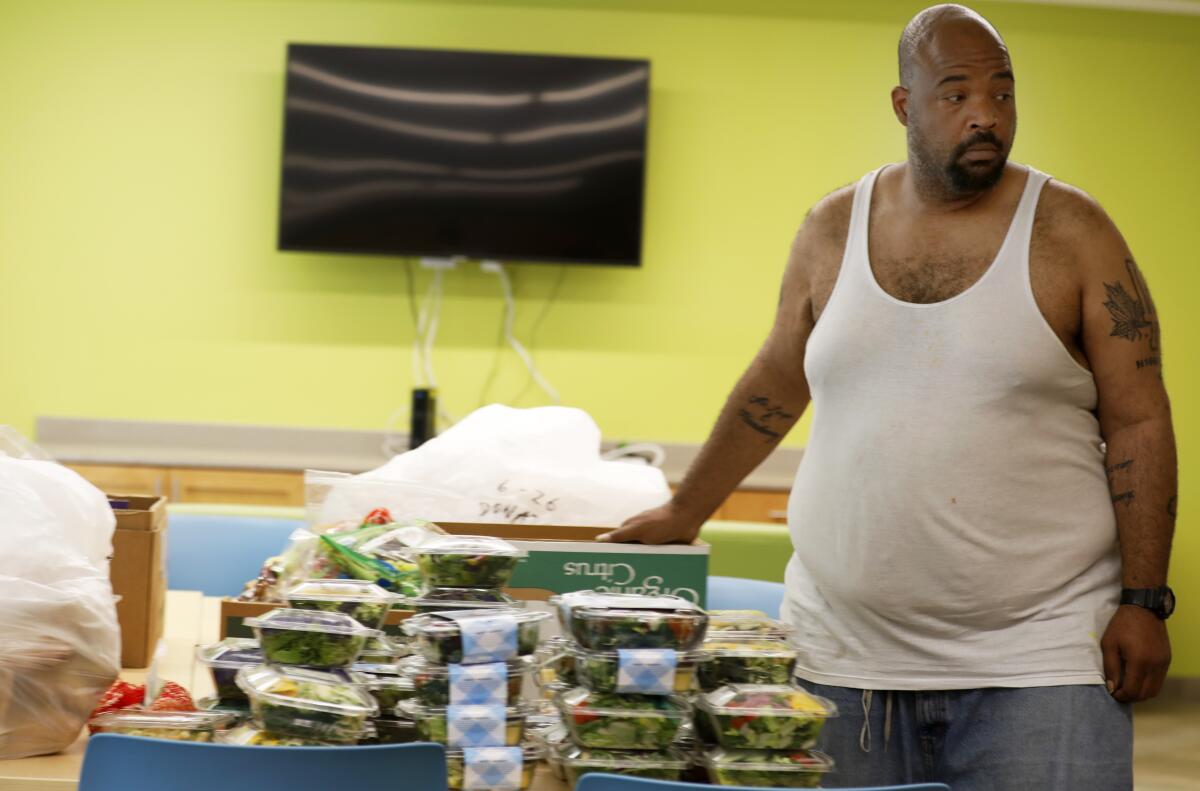
He paused over a photograph of him with a broom and dustpan trying to keep the sidewalk clean. The shot lays bare the trash of the encampment, and as much as he acknowledged that chapter of his life, he talked about changing that narrative.
“Readers see me as homeless,” he said, “and I want them to see me giving back.”
No longer focused on the comings and goings of the encampment — the exigencies of survival — he helped one resident last week deliver food to the homeless people living near Leimert Park. Four walls and a roof have given him the opportunity to think about taking the next steps in his life: rebuilding relationships with his son and daughter, advocating for those living on the streets.
“People helped me,” he said. “My City of Angels helped me. The general public needs to know what’s going on when it comes to homelessness. I want to sit down with the mayor. I want to talk to him about where I’ve been and what I’ve seen.”
He and Big Mama know that they won the lottery, figuratively speaking, when outreach workers visited them last year and devoted so many days and weeks to the paperwork and interviews that eventually cleared their encampment.
But now the real work begins, and Big Mama understands that it’s on her to try to find a place in the world: a job and relationships that will sustain her. No longer homeless, she is looking beyond her past and imagining what might lie ahead of her.
She caught a glimpse of that future last month when she and her old friend and neighbor, Top Shelf, volunteered at their church. For two weeks, they took the bus to the old neighborhood and helped prepare lunch for boys and girls who had gathered for two weeks of arts and crafts and special outings.
“I felt it in my heart,” she said. “The kids are part of me, and I’m part of the kids. They gave me something to do, and I was so happy inside. We would make animals out of paper and glue. And flowers. And beads. We went to see the new ‘Lion King.’ That was awesome. I felt like a big old kid.”
She proudly displays a certificate she was given at the end of the two weeks: “In recognition of all your hard work. We couldn’t have done it without you!”
After nine years on Broadway Place, the feeling she described was rare: To be valued and appreciated. She had somewhere to go in the morning and a safe home to come back to at the end of the day. But not all of her neighbors have been able to move beyond the street.
Looking at the newspaper, Big Mama turned to a picture of Niecy, covering her face, weeping after losing her apartment.
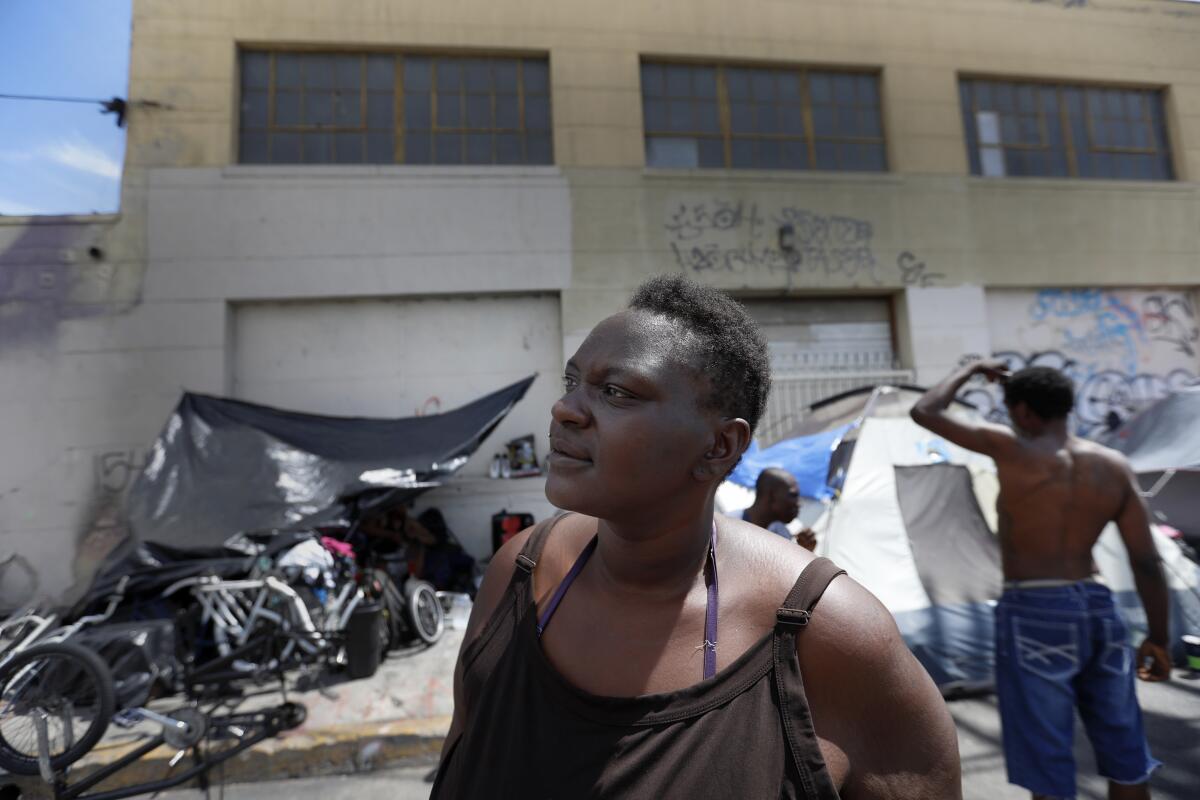
Leneace Pope, known to her friends as Niecy, had not been able to break her ties with the street, and then an ex-boyfriend — armed with a machete — came around one night and created a scene. He was banned from the premises, but Niecy continued to see him, giving property management no choice. She had to leave and soon returned to a tent on Main Street.
“Poor Niecy,” said Big Mama, mindful of the difficulties of living indoors.
Since settling into her new home, Big Mama has seen friends come and go, met the mayor, heard fights in neighboring units, endured false fire alarms and watched the rain fall from overcast skies. She feels secure, but she also knows that security is relative when living under someone else’s rules.
“I’m grateful and happy and at peace in my apartment,” she said but added she’s been having some problems with a neighbor who seems intent upon stomping around.
She knows that adjustments and accommodation have to be made, especially with nearly 160 people living in the two-building complex, but that doesn’t make it any easier. After years on the street, exposed and vulnerable, she is sensitive to the people around her.
These apartments, she said, are “a mental facility for all of us coming off the street,” and for her part, she keeps her door closed, to “keep bad people out of her comfort zone.”

Meet Duanne Hardaway and Keith Gaston
As the two of them talked in the air-conditioned cool of the activity room, Keith Gaston stopped by. He too was eager to share the news of his life, but first he lingered over a photograph of him and his mother, hugging one another, on the day he moved into his apartment.
This opportunity, he said, has only helped him focus on his faith. “Why not give God a chance?” he asked, as he began to sing a song that he put together in his mind.
Believe in Jesus. Cause God got the power. God got the power. Amen to that.
Singing, he said, has helped him whenever he feels Satan coming near, which has been frequent in this building. But he pushes evil — and temptation — aside by trying to help others. He has talked about taking to the stage, either as a preacher or even doing stand-up. He knows he can help people with his words and experience.
“I got the blessing inside of me,” he said, “and I got to reach out. I can make angry people happy and evil people, spiritual people.”
Now, though, he needed to head off.
He’s been selling his blood plasma at a clinic in Van Nuys; it doesn’t pay for much, but it helps. And it eases an old feeling that still haunts him: that he might have been able to help his wife and two daughters who died of a genetic brain disorder.
By making that donation, he too has found a sense of purpose, a first step making up for lost time.
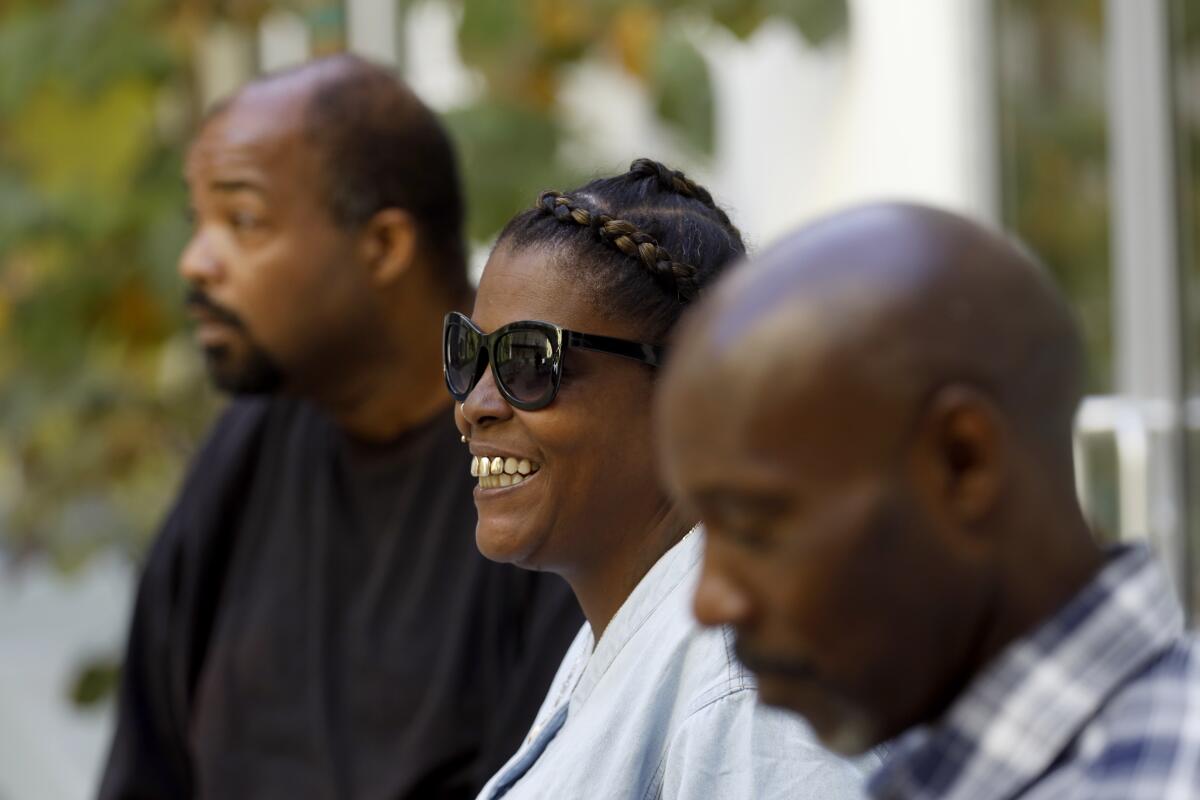
More to Read
Sign up for Essential California
The most important California stories and recommendations in your inbox every morning.
You may occasionally receive promotional content from the Los Angeles Times.
